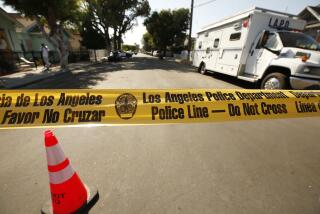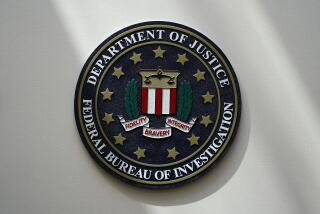Mideast Link to Pipe Bombs Sought
- Share via
NEW YORK — Counseling the need for caution, investigators Friday sought to determine whether links exist between Palestinian suspects accused of plotting to detonate nail-studded suicide bombs on New York’s subways and the radical Muslim group Hamas.
Agents said a definitive tie hasn’t been established, but the attack was imminent when three people were seized in a Brooklyn apartment with five bombs.
Gazi Ibrahim Abu Mezer, 23, and Lafi Khalil, 22, both from the West Bank, were charged in the alleged bomb plot. They were wounded, police said, after they tried to resist arrest and detonate one of the devices. Both suspects remained hospitalized Friday in stable condition. The third man is reportedly an informant in the case.
“This isn’t some simple armed robbery or bank robbery, not that these aren’t awful crimes,” said James K. Kallstrom, the head of the FBI’s New York field office. “It’s a very complex matter. It involves global issues.”
But he added that the FBI is not ready to claim any link to Hamas, saying: “We don’t know yet, and therefore it is totally wrong to say we do know.”
In Washington, a federal source familiar with the investigation also said ties had not yet been found between the suspects and Hamas. “The truth is they don’t know what they have here--just kooks acting on their own or people with direction,” he said.
And Hamas has never conducted acts of terror in the United States because it raises considerable amounts of money from Americans for its social and welfare services, pointed out another well-placed law enforcement official in Washington. Nonetheless, he said, apparent plans by the suspects to conduct suicide subway attacks raised a new level of terrorism.
“This was not a high-tech operation, yet it does cross a threshold since we’ve not seen Mideast suicide operatives in the U.S.,” the official said. “All other episodes have involved planted explosives and escapes.”
Complicating the investigation, one intelligence specialist pointed out, was the fact that Hamas, which has claimed responsibility for Wednesday’s terrorist bombing in a Jerusalem marketplace that killed at least 13 people, is not an organization that issues membership cards. He raised the possibility the two men could be self-appointed members of Hamas.
Police, who found bombs armed with toggle switches that were to be worn by suicide bombers, tightened security at tourist attractions, synagogues and U.N. missions.
Kallstrom said the city was “close to disaster” when the bombs were discovered.
Both he and New York Police Commissioner Howard Safir said at a City Hall news conference with Mayor Rudolph W. Giuliani that a great deal of evidence was recovered from the apartment in a shabby two-story red-brick building with a courtyard filled with soda cans, toys, a large orange highway safety cone and a Ping-Pong table.
“We obviously have a lot of leads,” Kallstrom said. “We’re going to be taking appropriate action.”
Giuliani toured neighborhoods with large numbers of Jewish residents in an effort to calm fears. “I would tell people to just go about what they are doing absolutely normally. There is no reason to change anything,” the mayor said, adding that police would be increasing security in some areas.
Members of the joint FBI/police terrorist task force said that evidence shows there was a plan to target U.S. and Jewish interests worldwide. The evidence, it was learned, included a note recovered from the apartment where the bombs were found early Thursday after a tip to police. The note was near or attached to one of the bombs, leading investigators to wonder whether the warning was sheer bravado or whether the plotters had some way of carrying out their threat.
Giuliani criticized the Immigration and Naturalization Service for letting Abu Mezer into the United States after he filed an asylum request saying he had been arrested in Israel and accused of being a member of a known terrorist organization.
“I hope we learn something from this and tighten up our procedures,” Giuliani said. “I think it is appropriate to question why this person was allowed into the country announcing that he was part of a terrorist group in Israel.”
INS spokeswoman Carol Forman confirmed Friday that Abu Mezer had filed for asylum but had later withdrawn his request.
Forman said it has not been determined whether he actually filed the document reporting the details of his arrest in Israel. A copy of the form was found in the Brooklyn apartment, but she said that does not mean he actually filed it with the government.
Abu Mezer entered the United States illegally on Jan. 14, 1997, and was detained by the Border Patrol in Bellingham, Wash. After a number of hearings, his bond was reduced from $15,000 to $5,000 on Feb. 6 by an immigration judge in Washington state. He paid the bond.
Forman said that on April 7, Abu Mezer asked for an asylum hearing but soon changed his mind. On June 23, he was ordered to leave the country within 60 days.
President Clinton in Washington declined to comment on possible connections between the subway plot and terrorism in the Mideast.
“It’s important not to reach conclusions before we have ironclad evidence to support them,” he said.
Goldman reported from New York, Ostrow from Washington. Times staff writer Robin Wright in Washington, special correspondent Lisa Meyer in New York and researcher Lynette Ferdinand in New York contributed to this story.
More to Read
Sign up for Essential California
The most important California stories and recommendations in your inbox every morning.
You may occasionally receive promotional content from the Los Angeles Times.










